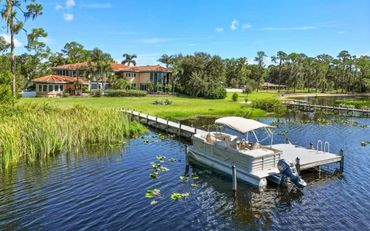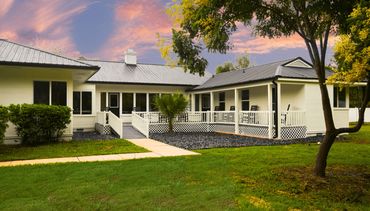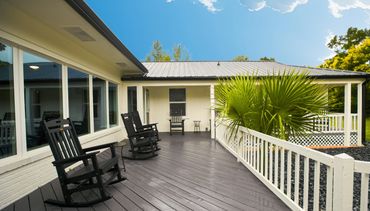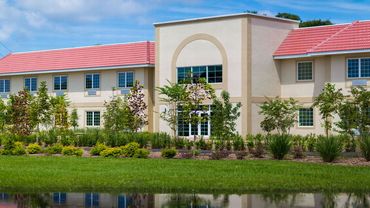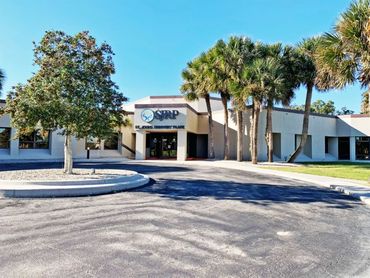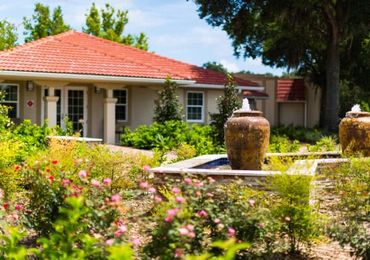
Drug & Alcohol Rehab Centers near Hillsborough County, FL
Looking for a high-quality alcohol or drug rehab in Hillsborough County, Florida, for a loved one or yourself? Rehabs.com provides valuable information about the best rehab centers in Hillsborough County. We know selecting a rehab can be daunting and somewhat confusing. We’re here to help you find the right drug and alcohol treatment center for you. We provide information on both outpatient and inpatient alcohol and drug treatment facilities so you can make the decision that is the best fit for you or your loved one. Attending rehabs in Florida can help you or your loved one start on the path to sobriety. Search for a facility that offers addiction treatment and rehab in Hillsborough County to begin the next, healthier chapter of your life.
Treatment Centers near Hillsborough County, FL
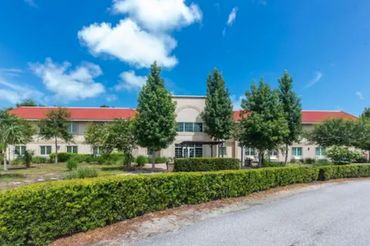
Open to Travel? Check out Top-Rated Options
All Treatment Centers near Hillsborough County, FL
- West Palm Beach Rehabs
- Miami Rehabs
- Fort Lauderdale Rehabs
- Jacksonville Rehabs
- Delray Beach Rehabs
- Tampa Rehabs
- Orlando Rehabs
- Pompano Beach Rehabs
- Fort Myers Rehabs
- Sarasota Rehabs
Information About Rehab in Hillsborough County
Inpatient vs Outpatient
Outpatient and Inpatient Rehab Centers
When a person decides to enter inpatient drug and alcohol rehab, they are agreeing to live on-site at the facility for a duration of time, usually anywhere from 30 days to 6 months. Your time at the rehab center will begin with a comprehensive intake examination and meeting with staff to determine your unique situation and needs. If you have any underlying medical or psychological conditions, these will be addressed during your stay at the treatment facility. Inpatient programs work with you to develop your own personal recovery plan to ensure long-term success.
Attending inpatient rehab often begins with the first step of medically assisted detox. This involves a 3-5 day process in which medications may be used to help you safely withdraw from the abused substances. Medical professionals will provide around-the-clock care during this time. Once detox is complete, residents will begin the full rehabilitation process in an inpatient facility, which involves a lot of counseling both alone with a therapist and in group sessions, medication regulation, and learning important life skills to help you get and stay sober.
Outpatient drug and alcohol rehab centers allow you to live at home while attending treatment. You will be required to attend the rehab facility for a set number of hours and days each week. If you opt for outpatient treatment, you may continue working in some cases. Many people choose outpatient rehab once they have completed an inpatient treatment program as a next step on the road to recovery while still receiving ongoing support. In outpatient treatment, you will attend regular group and individual counseling sessions, learn about the root and triggers for your addiction, and gain important life and coping skills to help you stay sober.
What is the Difference Between Inpatient and Outpatient Rehab?
Understanding the difference between inpatient and outpatient rehab is important before choosing which one you or your loved one will participate in.
Inpatient recovery programs—also known as residential rehab—require patients to live in the facility day and night, for a prescribed number of days. Most residential programs last from 30-90 days, depending on the person’s needs and substances used. Most inpatient rehabs offer medically assisted detox services to help you comfortably withdraw from drugs and alcohol. Inpatient residents have 24/7 support from professional staff throughout their stay. Days are structured and predictable, and food and cleaning services are often provided so you can focus on what is most important: getting and staying sober.
Outpatient rehab recovery programs allow you the opportunity to live at home. These programs are often more flexible; most require 10-14 hours a week at the treatment center to engage in individual and group therapy sessions. People in outpatient drug and alcohol rehab can continue working throughout the program but need to show they are trustworthy and can show up at the designated times to complete the program. Outpatient drug and alcohol programs are helpful for those who have a mild addiction, haven’t been abusing substances for long, or have completed inpatient treatment. Outpatient programs can last anywhere from 3 months to a year, depending on your needs. Many patients engage in both inpatient and outpatient treatment to give themselves the best chance at success and long-term recovery.
Latest Reviews
Latest Reviews of Rehabs in Florida
Boca Recovery Center - Boca Raton, FL
The Boca Recovery Center provides exceptional clinical services by a dedicated and professional staff. I highly reccomend this treatment center for anyone seeking to recover from addiction.
St. John’s Recovery Place
To whom it may concern, SJRP changed my life with the infinite amount of love and patience they offered to me. The variety of food and activities made me excited for each day that came along. Activities included the gym, equine therapy, horse back riding, NIT/VAT therapy ( which is amazing!!!), painting and reading, meditation, group and one on one therapy sessions. Extra activities include park excursions, kayaking, visiting springs, and the beach. All the staff ranging from the Director of Operations down to the Custodians are there to provide tender loving care for the betterment of each client. I speak from personal experience and this is why I am so grateful for the opportunity to attend Saint Johns Recovery Place.
Recovery First Treatment Center, Hollywood
Outstanding center where the staff really care about you and helps you through the good times and bad. Getting help is the first step towards becoming the person who you once were and building trust with your family and Friends. There are so many staff members that were professional and caring and I know I can't mention them all but thank you from the bottom of my heart and my families to David, Sarge, Nardy, Marie, Jeff, Susanne, Arron, Lachandia, Nateshia, Nate, Anthony, Adrian, Kim, Anna, Andy, Melina, Marie, Nancy, Gregand many more. Thank you again Recovery First for giving me my life back, helping me heal and rebuilding the love and trust with my family.
More Info
Hillsborough County, Florida, Substance Abuse Statistics
Drug and alcohol abuse is a major concern in Hillsborough County, Florida. If you or a loved one are misusing drugs or alcohol, you’re not alone. An estimated 9% of the population of the county struggles with substance use disorder (SUD).1 Substance abuse has a significant impact on an individual, their family, and their community, too. Getting help at a drug and alcohol rehab facility can be the first step to living a sober life.
Drug Abuse in Hillsborough County, Florida
Drug abuse is a major concern in Hillsborough County, Florida. Tampa is a port town, which means it is a hub for illicit drug sales coming from Mexico and other countries. Marijuana, cocaine, and opioids—both prescription and street opioids—are the most commonly abused drugs in Hillsborough County. In 2017, there were a total of 299 overdose deaths in Hillsborough County, of which 180 were opioid-related deaths.2
Alcohol Abuse in Hillsborough County, Florida
Alcohol misuse is common in Hillsborough County, Florida. In fact, it is the number one substance of abuse in the area. More people died from alcohol-related causes in Hillsborough County than in any other county in Florida in 2011.3 Approximately 5.6% of Hillsborough County residents engage in heavy binge drinking. This is higher than the state of Florida’s average of 5.2%.1
How to Find the Best Rehab Facility Near Me
There are many treatment facilities to choose from in the Hillsborough County, FL area. When searching for a rehab facility, you’ll want to ensure it uses evidence-based therapies and provides individualized care. Accredited rehab centers are the most reputable, so be sure to choose an accredited treatment center that is up-to-date with its licensing.
When looking for an alcohol rehab program or a drug rehab program that can treat the full scope of potential issues, look for treatment programs that:
- Treat mental health disorders.
- Are specifically tailored to treat the misused substances.
- Do not rely on high-risk strategies for withdrawal and detox, including rapid detox.
- Address issues beyond detox. They should also focus on the lifestyle, emotional, and psychological factors that have contributed to the substance use disorder.
- Focus on treating specific groups, including women, veterans, LGBTQ, and those with co-occurring disorders.
Googling the best or top-rated rehab centers in Hillsborough County will allow you to read reviews from other people who have received services from these facilities and get a good idea of what the experiences are like there and which are preferred by previous patients.
30-Day Programs
When it comes to inpatient treatment, a 30-day drug rehab or 30-day alcohol rehab program has you live at the treatment facility (anywhere between 28-20 days). While you are in treatment, you will attend individual and group therapy sessions, participate in 12-step or other support group meetings, and learn relapse prevention techniques to help you remain sober once you return home.
Thirty-day drug rehab programs can be a good beginning point for those who are struggling with drug or alcohol addiction. While it may feel overwhelming to commit to a long period of treatment, 30 days may feel short enough that patients are more willing to commit to rehab. In addition, a 30-day treatment program gives patients the time they need to go through detox and begin to address the underlying issues that contributed to their substance abuse. This allows them to being living a sober lifestyle that they can continue working on after the complete treatment.
90-Day Programs
Ninety-day treatment programs include intake and evaluation, detox, therapy, self-help groups, and aftercare. A 90-day drug rehab or 90-day alcohol rehab program may provide patients with the time they need to learn and develop habits and strategies that they can use as they pursue recovery after treatment. It can take time to develop habits and learn skills, and 90-day treatment programs may provide the needed time a safe and supportive environment.
Long-term treatment programs are also a good option for those who have a long-standing substance abuse issue, have relapsed, or feel that they need more time to work on the skills they need to support their recovery.
How to Find Dual Diagnosis Rehab Centers In Hillsborough County
In the United States, an estimated 8.2 million adults ages 18 or older have co-occurring disorders, meaning they have a mental illness—including anxiety, mood disorders, depression, and PTSD—and also struggle with SUDs. 4 People with co-occurring disorders must receive treatment for both types of disorders at the same time. Treating one condition but not the other is not as effective as treating both simultaneously. Addiction specialists at dual diagnosis rehab centers can provide effective comprehensive treatment.
Recovery First Treatment Center, an American Addiction Centers facility, offers dual diagnosis treatment. We provide comprehensive care that includes mental health treatment, and we tailor your treatment so that you get the individual attention and services that you need to recover and feel your best.
How to Pay for Care
Although addiction treatment can be very expensive, there are various ways to pay for treatment. Many people pay for alcohol and drug rehab with private insurance. However, there are other options that may help you obtain the treatment you are looking for, including grants, scholarships, sliding pay scales, and payment plans. There are also state and federally run facilities that can provide treatment. Don’t let the fear of the price of rehab stop you from pursuing the care, support, and treatment that you need.
Medicaid Coverage for Drug and Alcohol Addiction Treatment
Medicaid is the largest healthcare insurance program in the country.6 It is a joint federal and state program that provides free or low-cost insurance coverage to low-income applicants who are:7
- 65 or older.
- 19 or younger.
- Pregnant.
- Disabled.
- Caring for a child.
The Affordable Care Act (ACA) expanded eligibility for Medicaid coverage to include other groups and income levels, depending on your state.
Medicaid does typically cover drug and alcohol rehab treatment. Medicaid rehab coverage may vary depending on a person’s particular insurance plan. The costs associated with substance abuse and addiction treatment may vary between Medicaid health insurance members by state
Medicare typically covers the cost of alcohol and drug addiction treatment, but coverage may vary depending on your individual insurance plan. In addition, costs associated with addiction rehab may vary based on the state of residence for the Medicaid insurance member.
Insurance
The Affordable Care Act (ACA), passed in 2010, requires that all health insurance providers must provide coverage for addiction treatment services. Insurance plans must provide coverage for mental health services, including addiction treatment.
Depending on your state and your health plan, specific behavioral health benefits may vary. Insurance companies cover part or all of the costs of rehabilitation, so coverage may vary.
Treatment Without Insurance
There are low-cost, and even free, treatment programs for those who do not have insurance. Many states provide funding for rehab services that can be accessed by those with no insurance or income. There are also scholarships that may be available at individual treatment facilities. Some facilities may be open to establishing a payment plan that allows you to pay off your treatment over time. In addition, there are certain organizations that provide assistance to those who have no insurance but are seeking alcohol or drug addiction rehab.
Not having insurance does not mean you cannot obtain treatment for substance abuse.
What Substance Addiction do Rehab Facilities Offer Treatment For?
Alcohol or drug addiction may involve the misuse of various substances. When patients look for help, they may be pursuing:
There are treatment facilities in Dallas County and beyond that provide treatment for various drug addictions.
Cities in Hillsborough County, Florida
Hillsborough County is located in Central Florida. In 2016, the population of the county was 1,352,797.5 The following cities and towns are in Hillsborough County:
- Plant City
- Tampa
- Temple Terrace
If you or someone you love lives with a substance use disorder and is ready to get and stay sober, the time to seek treatment is now. The sooner you begin your journey to sobriety by entering a drug and alcohol treatment program, the sooner you can get yourself healthy and on the path to wellness. No matter what substances you’ve used, the best drug and alcohol rehab centers will support you and do their best to ensure your comfort, safety, and long-term success in living a sober life in recovery.
Sources
- Substance Abuse and Mental Health Services Administration. (2012). Substance Use and Mental Disorders in the Tampa-St. Petersburg-Clearwater MSA.
- Hillsborough County Anti-Drug Alliance. (2018). Partnerships For Success Grant Drug Epidemiology Network (DEN) Report Hillsborough County, Florida.
- Hillsborough County Anti-Drug Alliance. (2013). Profile of alcohol and drug indicators for Hillsborough County, Florida.
- Substance Abuse and Mental Health Services Administration. (2016). Results from the 2016 National Survey on Drug Use and Health.
- Florida Counties Map. (2016). Hillsborough County Towns and Cities.
- Medicare.gov. (n.d.). What’s Medicare.

